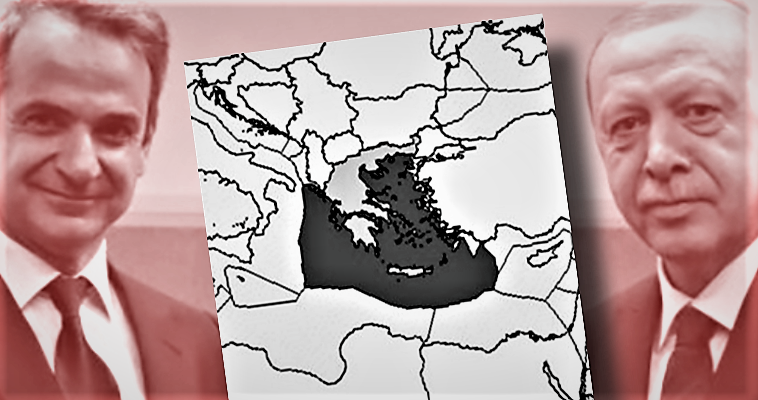Grigoris Tsaltas: Why Greece needed the agreements with Italy and Egypt
19/08/2020
Repeated attempts to interpret the content of the last two agreements signed by Greece with Italy and Egypt respectively for the delimitation of the EEZ in the maritime areas between the countries concerned, have led to wrong approaches and wrong conclusions. First of all, it should be emphasized that international law, which everyone rightly invokes, for any claims of Greece regarding the delimitation of maritime zones under national jurisdiction, is primarily political law.
In other words, both the formulation of the principles of international law and – and above all – the adoption of its rules are a consequence of the shaping, promotion and submission of the political positions of international community member states, which is often asserted clearly and strongly through political negotiation, at the level of an international conference. But the same is true of the interpretation and application of these rules, which are again directly influenced by the policies of the states, which in turn also affect the respective resolution / delimitation through direct negotiations.
Even these international court rulings are influenced by politics, resulting in the issuance of often conflicting rulings on similar issues, invoking them at the level of argument when they see both a parallel and a consequent inability to formulate a clear view of case law.
In conclusion, the crystallization and interpretation of the rules of international law necessarily goes through the approach / understanding of the long-term political negotiation of the states that led to their adoption.
In a second phase, it is good to remember what the sources of international law are, from which states draw their respective foundations. According to Article 38 of the Statute of the International Court of Justice, these are three main and two ancillary sources. The three main ones are international conventions, international customary law and general principles of law. While, the auxiliary sources are court decisions (case law) and the lessons of recognized political scientists as auxiliary means for the determination of the rules of law.
This distribution of sources of international law gives states the opportunity to negotiate with each other, invoking on a case-by-case basis either all of these sources, or selectively some of them (eg case law) in order to promote their positions politically.
The results of the agreement with Egypt
The Greek-Egyptian agreement of August this year is the final written conclusion of a long-standing political negotiation, culminating after the latest provocative developments in the southeastern Mediterranean on the part of Turkey (Turkish-Libyan memorandum EEZ delimitation in the region).
Given the above reality, this agreement is thus a Greek foreign policy move of the highest political importance, at the given time and under these special circumstances. Coming to the letter of the agreement, we must also consider the substance of its effects in relation to international law.
First of all, we should emphasize that, given the illegal Turkish-Libyan memorandum, the recognition of the right of island territories in all maritime areas of national jurisdiction follows on the path of the Greek-Italian agreement on the delimitation of EEZs in the Ionian Sea. Practically this shields the necessary as well as mandatory application of the rules of the law of the sea, as a condition for maintaining the peaceful coexistence of all states in what are sensitive areas such as that of the semi-enclosed Mediterranean Sea.
Thus, the right of island territories to be assimilated to the mainland and to have all the maritime zones of national jurisdiction is a mandatory rule of international law, customary and twice codified (Convention on Continental Shelf 1958 – Montego Bay Convention on the Law of the Sea 1982), with a parallel recognition on the level of jurisprudence, as well (eg decision of the International Court of Justice on the delimitation of a continental shelf in the North Sea, 1969).
The equidistant midline method
Turkey, both in terms of declarations and de facto, through the Turkish Libyan memorandum in the eastern Mediterranean does not accept the existence of this right, resulting in the usurpation of island sovereign rights in the wider region of the Aegean archipelago and the southeastern Mediterranean.
The issue of the influence of island territories in these economic zones (EEZ and continental shelf), beside coastal and littoral areas, concerns only the demarcation process as well as the relevant methods to be followed and should not be confused with this right per se. This is essentially the result of the adoption of the Montego Bay Convention in 1982 and the deletion from Articles 74 and 83 of the delimitation of the respective zones between states with bordering or opposite coasts using the method of the equidistant midline as a “mandatory” measure.
The opposite happened in 1958 in the Convention (Geneva) for the continental shelf which verbatim refers to the equidistant middle line. The 1982 Convention maintains as a “model” the mid-term method only for the delimitation of the coastal zone, referring in the case of the EEZ and the continental shelf to a delimitation that “shall be effected by agreement on the basis of international law, as referred to in Article 38 of the Statute of the International Court of Justice, in order to achieve an equitable solution.”.
This, of course, does not preclude the use of the always tried and tested method of the equidistant midline, the adoption of which is left entirely to the will of the states concerned. The International Court of the Law of the Sea (Hamburg), in its decision of 23 September 2017 on the delimitation of the maritime border between Ghana and Cote d’Ivoire in the Atlantic Ocean, reaffirms the value of the principle of equidistance including the continental shelf / EEZ, thus recognizing that its implementation ensures a prima facie fair result.
Turkish claims are illegal
In conclusion, the influence of islands or other territories on the demarcation of zones of economic importance is sometimes followed by a demarcation method, either by the states themselves or by international courts, with the aim of corrective intervention in the delineation of the final demarcation line. On the contrary, Turkey’s non-recognition of the right of island territories to have all the relevant zones of national jurisdiction (Article 121 (2) of the Montego Bay Convention, with the exception of rocks and only for the two zones of economic concern) is a flagrant violation of the rules of international law, making the Turkish-Libyan memorandum illegal, in conjunction with the equally illegal delimitation of the EEZ, between states that do not have opposite shores.
Based on the above, the adoption of a partial maritime border line with Egypt (Article 1 of the recent agreement), leaving open the issue of its completion in accordance with international law, is a practice to be followed by states when third countries come between geographically. The aim is to complete the delimitation of the wider maritime area, in the context of the joint contribution to stability, on the basis of good faith and always in accordance with international law (see preamble to the agreement in conjunction with Article 1 (e)).
The last, essential / decisive step remains the immediate ratification of both agreements by the Greek parliament with simultaneous pressure on the respective parliaments of Italy and Egypt to do the same, so that the relevant texts can be sent to the United Nations as soon as possible. The boundaries resulting from these agreements are then announced by the Secretary-General for the parties to the Montego Bay Convention and posted on a relevant database of the relevant UN Office for Maritime Affairs & Maritime Law (DOALOS – Deposit of charts / lists of coordinates under the Convention). In addition, they are published in the UN edition, “Law of the Sea Bulletin”.
In any case, the reaction of Turkey, alone, to this Greek-Egyptian agreement, with the undertaking / development for the umpteenth time of actions aimed at illegal unilateral delimitation of the continental shelf and EEZ in the region, through the Cold War-style use of the research seismographic fleet it has developed since 1974. then, signifies the highest political importance of this agreement for Greek national interests, like any other similar action on the part of Greece.




